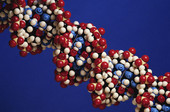- Could Your Grocery Store Meat Be Causing Recurring UTIs?
- Are You Making This Expensive Thermostat Error This Winter?
- Recognizing the Signs of Hypothyroidism
- 10 Strategies to Overcome Insomnia
- Could Artificial Sweeteners Be Aging the Brain Faster?
- Techniques for Soothing Your Nervous System
- Does the Water in Your House Smell Funny? Here’s Why
- Can a Daily Dose of Apple Cider Vinegar Actually Aid Weight Loss?
- 6 Health Beverages That Can Actually Spike Your Blood Sugar
- Treatment Options for Social Anxiety Disorder
Pursuing Pancreatic Cancer’s Deadly Secret


A new lab study might help explain why pancreatic cancer is so deadly.
“Patients with the earliest stage of pancreatic cancer have a survival rate of only 30 percent. This suggests that even in that very early stage of invasive cancer there are already cells that have spread to distant parts of the body,” said study author Dr. Diane Simeone, director of the Pancreatic Cancer Center at the University of Michigan Comprehensive Cancer Center.
“This study sheds important light on what it is about pancreatic cancer that makes it so aggressive early in the game,” she said in a university news release.
Using mice and tissue samples, researchers found that a gene known to be involved in nearly 90 percent of pancreatic cancers promotes cancer spread and growth.
The ATDC gene plays an important role in how a tumor progresses from the preinvasive stage to invasive cancer and then to metastatic cancer, which means it has spread to other areas of the body.
The findings were published Jan. 15 in the journal Genes and Development.
The ATDC gene offers a potential target for new drugs to treat pancreatic cancer, the researchers said. New treatments are crucial, as about 46,000 Americans will be diagnosed with pancreatic cancer this year and more than 39,000 will die of the disease, the researchers note in the news release.
By 2030, it’s expected that pancreatic cancer will be the second leading cause of U.S. cancer deaths, they said.
The researchers also said preliminary data suggests the ATDC gene may play a role in other cancers, including those of the bladder, ovaries, colon and lungs, as well as the blood cancer multiple myeloma.
More information
The American Cancer Society has more about pancreatic cancer.
Source: HealthDay
Copyright © 2026 HealthDay. All rights reserved.










